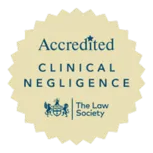
Case Study: Six-figure Compensation in Delayed Diagnosis of Cancer Case
Our client, a man in his 70s, visited his GP to complain of a number of symptoms and was referred to hospital under the 2-week suspected cancer referral rule.


Solicitor, Medical Negligence
Our client was suffering from squamous cell carcinoma of the left lip, which is a form of cancer. However, the cancer wasn’t immediately identified by doctors. As a result of this delayed cancer diagnosis, commencement of the necessary radiotherapy treatment our client required, was delayed too. Ultimately, this left our client with a disfigurement and symptoms including:
Squamous cell carcinoma is sometimes referred to simply as ‘SCC’. It is a form of non-melanoma skin cancer which is common and starts in the top layer of the skin. Usually, it can be treated.
SCC is mostly caused by ultraviolet light which comes from the sun. The NHS advise that if you have pale skin or have had skin cancer in the past, your chances of being diagnosed with a non-melanoma skin cancer is higher than average. Your age could also have an impact on this, together with the following factors:
The risk of developing this type of cancer can be reduced, simply by being careful in the sun. This would involve the use of sun creams and making sure that you re-apply your protectant on a regular basis. However, the NHS advise that you can also do the following to reduce your risk:
This type of cancer can usually be effectively treated, however the treatment you receive will depend on the type of skin cancer that you have, where the cancer is, whether or not the cancer has spread and your health generally/ whether you have any co-morbidities (existing health conditions that put a person at higher risk)
The main form of treatment for this type of cancer is surgery which can be done in several different ways, including an excisional biopsy and cryosurgery. An excisional biopsy involves cutting out the cancer and some of the surrounding skin whereas cryosurgery involves freezing the affected skin which forms a scab that usually drops off a few weeks later.
Radiotherapy, targeted medicines, photo dynamic therapy and chemotherapy can sometimes be used too. In our client’s case, he had to undergo an invasive 10 hour operation from which he made a slow recovery, in addition to requiring radiotherapy.
Sadly, our client remains self-conscious of his appearance due to his disfigurement, which affects his confidence and ability to carrying out activities of day to day life.




Simpson Millar LLP. (n.d.). Medical Negligence Solicitors. Retrieved from https://www.simpsonmillar.co.uk/medical-negligence-solicitors/ (Accessed: 18/12/2023)
NHS. (n.d.). Non-melanoma Skin Cancer: Treatment. Retrieved from https://www.nhs.uk/conditions/non-melanoma-skin-cancer/treatment/ (Accessed: 18/12/2023).
NHS Resolution. (n.d.). Alternative Dispute Resolution. Retrieved from https://resolution.nhs.uk/services/claims-management/alternative-dispute-resolution/ (Accessed: 18/12/2023).
Fill in the form below to get in touch with one of our dedicated team members, or call our team today on: 0800 260 5010